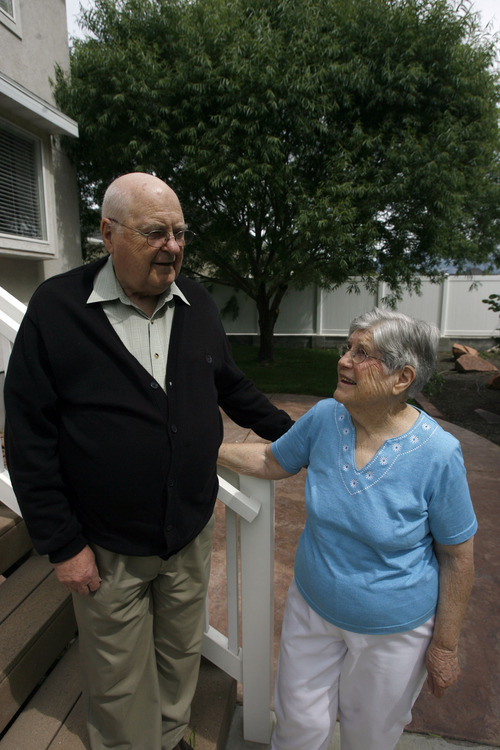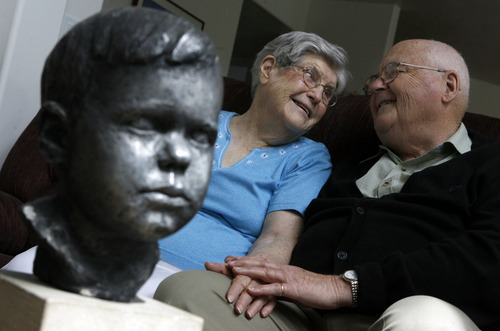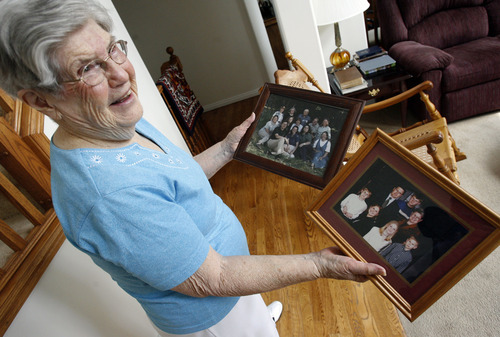This is an archived article that was published on sltrib.com in 2012, and information in the article may be outdated. It is provided only for personal research purposes and may not be reprinted.
Washington • From his office balcony, Matthew Tueller looked straight into Cairo's Tahrir Square and watched a revolution take shape, as hundreds of thousands of angry protesters demanded that Egypt's dictator make way for democracy.
Then they started heading his way.
Egyptian rebels overran the U.S. Embassy, taking control of vehicles, threatening the staff and looting homes. In response, Tueller had to help evacuate thousands of Americans, his family included, and hunker down.
In the midst of the chaos, he found a few minutes to call his father, Blaine, who pelted him with questions, but Tueller kept his answers brief.
"He would just say things like, 'I haven't been home in three days, but things are going OK,' " said Blaine Tueller, of Lehi, also a former diplomat.
He wasn't surprised. Matthew Tueller has always been reserved, even as a child. While he long knew he wanted to succeed his dad in the Foreign Service, Tueller never told his parents, though at the age of 16, he did reveal to one sister that he planned to be an ambassador by the age of 50.
He reached the goal, just five years late.
Tueller is now the ambassador to Kuwait, taking the oath only a few months removed from that harrowing experience in Egypt last year. At this time, he's also the highest-ranking Utahn in the administration of President Barack Obama.
His career is marked by major world events from being in Saudi Arabia during the Sept. 11 attacks to taking a call from the White House the night Princess Diana died.
Tueller equates his job to watching an epic football game, though that fails to describe the role he plays in the action.
"Often you are in places where you feel like you are on the sidelines of history," he said. "You have these great seats to see significant events transpire."
He's lived in more than a dozen countries throughout his life, with the first adventure abroad taking place when he was just 4 months old.
In 1957, the Tuellers boarded an ocean liner that rode the rough waters to Dublin, where his father began his career in the Foreign Service. The growing family next moved to Austria before Blaine Tueller took a post in the African nation of Morocco, a voyage that would leave an indelible imprint on many of his children.
—
Americans abroad • The family moved to Tangier in 1965 so that Blaine Tueller could study Arabic in what he hoped would be the first of many excursions into the Arab world. The exotic locale was as far removed from the United States as anything the Tuellers would experience. They lived near the beaches of the Mediterranean Sea and were the only American family and only Mormons in the area.
And yet, they found the people inviting.
"If you ask all of us who remember Morocco, all of us would say it was our favorite posting. Life was easy there for us," said Diane Tueller Pritchett, one of Matthew Tueller's eight sisters.
Like his father, Tueller took an interest in Arabic, going so far as to shun the standard French class in school in favor of learning the local dialect. He picked it up so quickly that he was able to serve as a tour guide when his family received visitors from the United States.
And Tueller admired his dad's profession, thinking that one day he, too, would like to be a diplomat.
"I knew that I enjoyed the exposure to different cultures," Tueller said in a phone interview with The Tribune from Kuwait. "And I thought there was no better thing than to be able to represent the United States of America abroad."
He got a taste of that cultural difference when his mom gave birth to his only brother, Jim, at the U.S. Naval Air Station in Kenitra, a five-hour drive from their home in Tangier. The word got back to the elementary school, and the Moroccan boys swarmed Tueller, lifting him onto their shoulders and marching him around the playground celebrating that the boy who had six sisters at the time finally had a baby brother.
"Having a son in the Arab world is always a big deal," he said. "It seemed pretty natural that I would be lifted up and carried around the playground. It was a very Moroccan thing."
Just as the Tuellers' time in Morocco was coming to an end, the Six-Day War of 1967 broke out, pitting Israel against Egypt, Jordan and Syria. In reaction, the United States began reducing the number of diplomats in Middle Eastern posts. Blaine Tueller decided to change his focus to Latin America, and the family uprooted to live in Venezuela, then Panama.
—
Finding a constant • Foreign Service officers move to a new embassy every three to four years, meaning that every friend is temporary and many of the children start at one school but finish at another. The Tuellers had two constants in their lives: their close family bonds and the LDS Church.
"Any first Sunday in a new place we went to church. All of a sudden we had all of these people as friends," said Jim Tueller, now a history professor at Brigham Young University-Hawaii, who still has Facebook friends from the LDS wards in places like Manila and Madrid.
His mother Jean, made sure the family stayed grounded in their faith, following not only the standard Sunday services, but "family home evenings" on Mondays and even celebrating Utah's Pioneer Day on July 24. And all 10 of the Tueller children attended BYU. "The church was very much the central part of our lives," Jean Tueller, 82, said.
And yet, their faith was an obstacle for her husband.
In the late 1950s, Blaine Tueller was one of very few Mormons in the diplomatic corps and at least one supervisor openly questioned whether his conservative morals were ill suited for a job that involves socializing with foreign dignitaries. Basically, he didn't like that Blaine Tueller would not drink alcohol or serve it in his home, and in those days it seemed odd that a Mormon would want to be a diplomat.
"It was seen as a lifestyle that was not necessarily compatible with a lot of Mormon habits and outlook," Matthew Tueller said.
Times have clearly changed. Tueller is one of dozens of Mormons in the Foreign Service now, and he said he has experienced no criticism for his faith. In fact, Middle East dignitaries almost always respect that he abstains from coffee, tea and alcohol for religious reasons.
He also happens to be the second consecutive BYU graduate to serve as ambassador to Kuwait, succeeding Ambassador Deborah K. Jones in the fall of 2011.
—
A standout • Young Matthew Tueller knew he wanted to study political science, but he also wanted to re-immerse himself in the Arabic he learned in Morocco. The problem was that BYU offered no Arabic courses.
Undeterred, he recruited a small group of interested students who persuaded administrators to create a class, but then, three weeks into the first semester, the elderly professor who agreed to take them on died.
BYU officials recruited Dilworth Parkinson from the University of Michigan to finish the course. He moved to Provo to teach Tueller and two other students, the only ones who remained. Since then Parkinson has built a nationally renowned Arabic program that has as many as 100 new students each year.
Tueller was his first standout.
"He was just an extremely bright, extremely diligent student," said Parkinson, who helped Tueller earn a prestigious scholarship to Cairo that allowed him to get a better grip on a tough language.
Tueller then enrolled in Harvard's Kennedy School of Business and worked a year in the Ronald Reagan administration before he was able to join the Foreign Service and return to the Middle East.
He joined just months before his father retired after returning from a post in Spain.
"He entered the service some time in 1985 and I left the service in 1986," said Blaine Tueller. "It was almost a continuation of one generation to the next."
—
Popular uprising • Tueller was able to accomplish what his father once dreamed of: a career in the Middle East.
As a student, Tueller watched Hosni Mubarak's rise to power in Egypt in 1981 and as a diplomat he was there to watch his fall, part of the uprising known as the Arab Spring.
Tueller knew the people disliked Mubarak, but he didn't pick up on the signs of a brewing revolution.
"It was astonishing," said Tueller. "I don't think anybody had predicted that there would be that sort of popular uprising."
And he didn't predict that those protesters would turn on the U.S. Embassy, which was only secured with reinforcements from the Egyptian military after the police left their posts and the country fell into turmoil.
"The inability to feel secure in our own embassy is unsettling," he said.
Once the situation in Cairo stabilized, Tueller helped the ambassador keep tabs on the protest leaders and communicate with Mubarak and the military, transmitting what information they could back to the White House, which was tentative in backing the uprising.
Tueller felt the full weight of his job, but he said moments such as this one also served as a reminder of why he sought to work in this region of the world.
"I wanted to be in places where I would be challenged and deal with some of the more difficult issues involved in advancing U.S. interests abroad," he said.
He got his wish not just in Cairo, but in Saudi Arabia, Iraq and Kuwait.
—
Sidelines of history • Tueller had recently arrived in Saudi Arabia to serve as the political counselor to the U.S. Embassy when 9/11 happened, and within hours of the collapse of the World Trade Center towers the world knew that most of the terrorist hijackers were Saudis.
In his standard understated way, he said: "It changed the nature of my work completely for the next three years."
Suddenly, like everyone else in the embassy, he became fixated on counterterrorism and a move to get the Saudis invested in rooting out al-Qaida. When terrorists attacked housing compounds in Riyadh, that job became easier, and the close relationship between the two nations has endured.
He later left behind his family in 2007 to serve in Baghdad as a political adviser. Those two years coincided with the military "surge" that helped stabilize the war-torn nation.
Tueller advised then-Ambassador Ryan Crocker as they sought to counsel Iraqi leaders to find a way to set aside tribal and religious differences to forge a working government. The dual strategy is now thought to have helped lead to the end of that conflict.
Historic as these events were, Tueller points to the reopening of the Embassy in Kuwait after the Persian Gulf War "as one of the most remarkable and important points in my career."
When he first flew into Kuwait, the oil fields were burning, the country was littered with mines and unexploded bombs and the nation's leaders were scattered around the globe.
And the people could not have been happier to see representatives of the United States.
"There was just this huge gratitude," said Tueller. "I think even now, 20 years later, Kuwaitis feel this strong connection to the United States. They believe that they owe the existence of the country today to the coalition that President [George H.W.] Bush led to expel the Iraqi occupation."
Tueller returned in 2004, helping to maintain that relationship as the United States used Kuwait as a key staging ground for the wars in Iraq and Afghanistan. He returned a third time, when Obama nominated him to be ambassador last year.
In all, he will likely spend more time in Kuwait than he has in any other place on the globe, but he says his heart remains in Utah.
—
Home • Matthew and DeNeece Tueller have a home in Provo, though they rarely get to visit. Instead, Tueller makes sure to call his parents back in Utah once a week, and he video chats with his grandchildren in Arizona regularly.
And he has imported slices of home to Kuwait City. All of the art in the Embassy comes from Utah artists.
Paintings and photographs of the state's desert beauty, from the redrock arches to the Uinta Mountains, adorn the walls.
Tueller shows them to guests as he explains his home.
"It is important that you have a sense of where you really belong," he said. "We have tried very much to instill in our family that Utah is where home is."
mcanham@sltrib.comTwitter: @mattcanham







